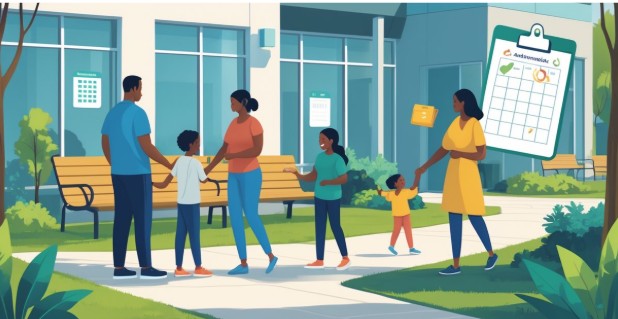Special Focus Facility (SFF) Program Explained: What Georgia Families Should Know
Originally published: October 2025 | Reviewed by Sadie Mays
Originally published: October 2025 | Reviewed by Sadie Mays

The Special Focus Facility (SFF) Program is a federal initiative run by the Centers for Medicare & Medicaid Services (CMS) that flags nursing homes with persistent, serious deficiencies.
These facilities face heightened inspections, penalties, and possible funding loss until they demonstrate sustained improvement.
For Georgia families, knowing whether a facility is on the SFF list helps avoid unsafe placements and guides better long-term care choices.
The Special Focus Facility program identifies nursing homes with serious quality issues and places them under strict federal oversight to promote improvements.
Special Focus Facilities are nursing homes that don’t meet the standard quality of care and are placed in a unique program meant to encourage better care practices.
Understanding how this program works helps Georgia families make more informed choices about their loved ones’ care.
Facilities on this list are subject to additional inspections, potential penalties, and, in some cases, restrictions on new admissions until they can demonstrate real, lasting improvements in resident safety and care quality.

The Special Focus Facility program singles out nursing homes with serious quality problems and puts them under increased federal monitoring.
These facilities get more frequent inspections and stricter oversight than your average nursing home.
The Centers for Medicare & Medicaid Services launched the Special Focus Facility program to improve care in the poorest performing nursing homes. CMS wanted to protect residents in facilities with repeated quality issues.
The program targets nursing homes that keep failing to meet basic care standards. CMS identifies facilities with a history of serious quality problems and puts them on the SFF list.
Federal oversight through this program aims to force improvements. If facilities don’t show real progress, CMS can pull their Medicare and Medicaid funding.
The list gets updated regularly. CMS publicly discloses the names of facilities chosen to participate in this program, allowing families to make more informed decisions.
Special Focus Facilities deal with much stricter monitoring than regular nursing homes. CMS and State survey agencies survey these facilities twice per year, about double the usual rate.
Key differences include:
Facilities on the SFF list face intensified scrutiny, frequent surveys, and increased risk of admissions freezes. Some even lose their ability to accept patients covered by Medicare and Medicaid.
Regular nursing homes usually get inspected once a year. SFF facilities, on the other hand, stay under the microscope until they prove they’ve made real, lasting improvements in care quality.
At Sadie G. Mays, Georgia families find trusted care outside the SFF list, with transparency and compassion at every step. Contact us today.
If you’re ready to get started, call us now!

Facilities are ranked by deficiency count, severity, and inspection history; those scoring worst become SFF candidates and may be selected into the program through state-CMS processes.
The Centers for Medicare & Medicaid Services uses a point-based system to spot nursing homes with ongoing quality problems. Facilities rack up points based on inspection deficiencies and complaint investigations.
Severity levels range from minimal harm to immediate jeopardy to the resident’s health and safety. More serious violations mean higher point values in the system.
Frequency of problems also matters. Nursing homes that rack up repeated violations across multiple inspections receive more penalty points.
The system looks at data from the last three years of standard surveys. This includes both scheduled annual inspections and any complaint investigations that lead to citations.
Facilities with the highest point totals in each state become candidates for SFF designation or active placement. So, the worst-performing nursing homes end up with the most oversight.
| Status | Oversight Level | Survey Frequency | Family Impact |
| Candidate | Warning status for high-risk homes | ~12 months | Signals risk, not yet full SFF |
| Active SFF | Intensive CMS monitoring | ~6 months | Higher penalties, admission freezes, and reputation risk |
| Graduation | Removed after sustained improvement | Normal annual | Shows compliance restored |
| Termination | Medicare/Medicaid contract ended | N/A | The facility may close or operate privately |
Nursing homes progress through the SFF program in stages, depending on their performance during increased oversight.
Candidate facilities can avoid active SFF placement if they show real improvement. They need to achieve better inspection results and report fewer serious violations during this period.
Promotion to active SFF occurs when candidate facilities can’t improve or continue to experience serious quality issues. Active facilities face intensified scrutiny and increased risk of fines.
Graduation occurs when facilities show steady improvement over multiple inspection cycles. They must meet specific performance standards and sustain those improvements.
Termination from Medicare and Medicaid programs is the last resort for facilities that cannot meet the requirements. This typically means the nursing home must close or operate without federal funding.
CMS sets threshold citation numbers that facilities must stay under to graduate from the program.
Once a nursing home becomes a Special Focus Facility, it enters a structured program with clear requirements and timelines.
The facility must either improve and graduate from the program or face serious consequences, including possible closure.
After the receiving an SFF designation, facilities receive greater oversight and must work toward graduation from the program. State survey agencies conduct more frequent inspections to closely track progress.
The facility gets written notice within five business days of being designated. This notice clearly outlines the expected improvements.
| Outcome | Requirements | Timeline |
| Graduation | Two consecutive surveys with no Immediate Jeopardy citations; sustained compliance | Varies |
| Continued Monitoring | Ongoing deficiencies, but some progress | Until criteria met |
| Termination | Failure to improve; CMS ends funding | ~18–24 months typical |
Facilities that “yo-yo” back into non-compliance after graduation are subject to stricter oversight. CMS closely monitors these repeat offenders to prevent further issues.
| Outcome | Requirements | Timeline |
| Graduation | Two consecutive standard surveys with no immediate jeopardy citations | Varies by facility |
| Continued Monitoring | Ongoing compliance efforts required | Until the graduation criteria are met |
| Termination | Failure to improve after extended oversight | 18-24 months typically |
Graduation criteria include:
Families should know that the SFF designation indicates the facility is actively working to improve. Still, it also signals that serious quality of care issues existed in the past.
Some facilities manage to maintain high standards after graduation. Others struggle to meet the requirements and might face termination from government programs.
Sadie G. Mays helps families navigate quality reports, inspections, and care decisions with confidence. Discover our standards and peace of mind—schedule an appointment now.
If you’re ready to get started, call us now!
Knowing a nursing home’s SFF status helps families make informed decisions about their loved one’s care and safety.
If you know how to check this status and spot warning signs, you can help protect residents from potential harm.
Families can check if a Georgia nursing home appears on the Special Focus Facility list through CMS. The CMS website updates this list every quarter in 2025.
The Medicare Care Compare tool shows detailed nursing home quality ratings. If a facility has one or two stars, that’s usually a sign of serious quality issues.
Key steps to check SFF status:
It’s smart to review Georgia’s Department of Community Health inspection reports, too. These reports document violations and compliance issues identified by surveyors during their visits.
Red flags that concern families:
Quality signals families should seek:
Facilities on the SFF list receive extra scrutiny and undergo additional surveys every six months. This kind of oversight often uncovers problems that put residents at risk.
It’s best to avoid homes with recent termination notices from Medicare or Medicaid. Those notices mean the facility failed to meet basic safety or care standards.
If a preferred nursing home is on the SFF list, review survey reports, meet with leadership, and prepare backup care options.
Start by reading the facility’s inspection history on the CMS website. That’ll show exactly why the nursing home landed on the Special Focus Facility list.
Look for repeated violations. If the same problems persist, that’s a sign of ongoing care quality issues.
Key areas to examine:
Drop by the facility unannounced and at different times. Observe how staff interact with residents and inspect the premises for cleanliness.
Ask the administrators what they’re doing to improve. Facilities on the SFF list are surveyed frequently and must demonstrate progress.
Talk to families who already have loved ones there. Their stories give you a sense of what really happens on a day-to-day basis.
SFF facilities risk losing Medicare and Medicaid funding if they fail to turn things around. Therefore, it’s essential to have backup options in place in case your loved one needs a new living arrangement.
Make a list of three other facilities nearby. Visit them and ask about admission requirements and availability.
Essential preparations include:
Keep all important documents handy. Medical histories, medication lists, and care preferences help new staff provide the right care from day one.
Stay in contact with the current facility’s administration. They’re supposed to give you advance notice before making big changes or closing.
Reach out to other families in similar situations. They can share tips about local care options and their own transition experiences.
Sadie G. Mays Health & Rehabilitation Center really stands out for its focus on personalized care and a strong community reputation. They give families real chances to connect and see how they approach senior care.
You can get information about Sadie G. Mays through their admissions resources. The staff maintains open communication about services and availability.
Key admission details include:
The admissions process helps families see what sets Sadie G. Mays apart. They share details about their care philosophy and the services they offer.
Most families compare several facilities before making a decision. Having quick access to admission info definitely makes things easier.
When you visit in person, you get a genuine sense of how much the facility values quality. You can meet staff and see what daily life looks like here.
When you schedule a tour, you can see whether the facility meets your loved one’s needs. The admissions team will be happy to answer your questions about care plans and services during your visit.
If you can’t visit right away, you can call for a phone consultation instead. The admissions staff will talk through care options and help you figure out if Sadie G. Mays is a good match.
Choosing the right nursing home matters. Sadie G. Mays provides accredited care with dignity and safety for Georgia families. Contact us today.
What is a Special Focus Facility (SFF)?
A Special Focus Facility is a nursing home flagged by CMS for repeated serious quality issues and placed under stricter oversight until improvements are made.
How do I know if a Georgia nursing home is on the SFF list?
Families can check the official CMS SFF list or Nursing Home Compare online. Georgia facilities on the list will be clearly identified with public reports.
Can a nursing home improve and graduate from the SFF program?
Yes. If a facility shows consistent improvement over at least two surveys, it can graduate from the program and be removed from the SFF list.
What happens if an SFF facility does not improve?
If quality problems persist, CMS may terminate the facility’s participation in Medicare and Medicaid, resulting in funding losses and potential closure.
Why does SFF status matter for families choosing care in Georgia?
SFF status is a red flag that signals persistent safety or quality issues, helping families make informed choices and avoid risky facilities.
Are Georgia State Veterans Homes ever part of the SFF program?
Yes, any nursing facility can be listed if it meets criteria, but state veterans homes are also subject to state oversight in addition to CMS rules.
What should families do if their preferred facility is on the SFF list?
Request recent inspection reports, ask about improvement plans, visit in person, and prepare alternative care options in case conditions don’t improve.